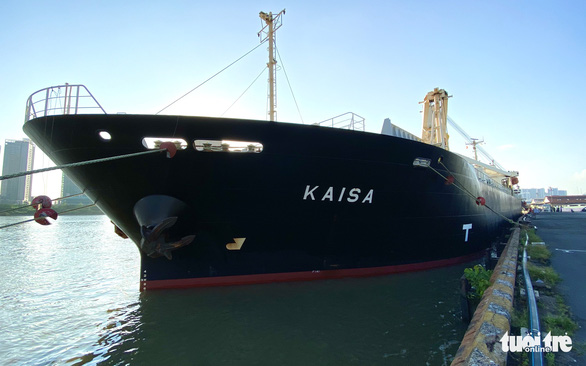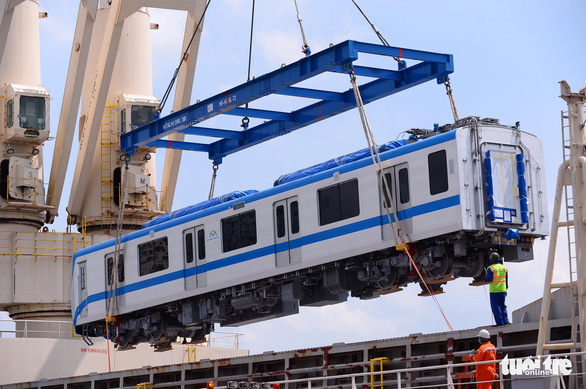The second and third trains of Ho Chi Minh City’s metro line No. 1 have reached a seaport in the southern metropolis after a nine-day journey.
The trains were transported by the Kaisa cargo vessel, which docked at Khanh Hoi Port in District 4 at around 6:00 am on Monday.
The ship began its voyage at the Port of Kasado in Japan on May 1.
[VIDEO id="1620639923240" alt=" "]https://secure3.vncdn.vn/ttnew/r/2021/05/10/toataumetro-162061693948342374645-dff5b-1620639742.mp4[/VIDEO]
After being unloaded from the ship, the second and third trains will be transported by road from the port to the Long Binh depot of the metro line in Thu Duc City on May 11 and 13, respectively.
They will then be installed on the T1 track at the depot for trial operations.
This is a very important milestone of the metro project, marking the official transition from construction and installation to trial operations, said the municipal Management Authority for Urban Railways.
To date, three out of the metro line's 17 trains, consisting of 51 carriages, have been delivered to Vietnam from Japan, with the first arriving at the port on October 8, 2020.
|
|
| The Kaisa vessel, which carries two trains of Ho Chi Minh City’s metro line No. 1, is seen being docked at Khanh Hoi Port in the city, May 10, 2021. Photo: Quang Dinh / Tuoi Tre |
The next trains will be brought home in the coming time and the line is expected to be put into commercial operation next year.
Each train has three carriages and can carry a total of 930 passengers, including 147 seated and 783 standing guests.
The metro line is 19.7 kilometers long, including 2.6 kilometers of underground railways and 17.1 kilometers of elevated tracks.
The route runs from Ben Thanh Market in District 1 to Suoi Tien Theme Park in Thu Duc City through three underground stations and 11 stops above the ground.
|
|
| A train carriage is unloaded from the Kaisa vessel at Khanh Hoi Port in Ho Chi Minh City on May 10, 2021. Photo: Quang Dinh / Tuoi Tre |
The maximum speed is 110 kilometers per hour along the elevated section and 80 kilometers an hour underground.
About 84.44 percent of the workload of the project, which started in August 2012, has completed so far, Tien Phong newspaper reported.
The project costs more than VND43.7 trillion (US$1.9 billion), most of which has come from Japan's official development assistance (ODA).
Like us on Facebook or follow us on Twitter to get the latest news about Vietnam!




Max: 1500 characters
There are no comments yet. Be the first to comment.